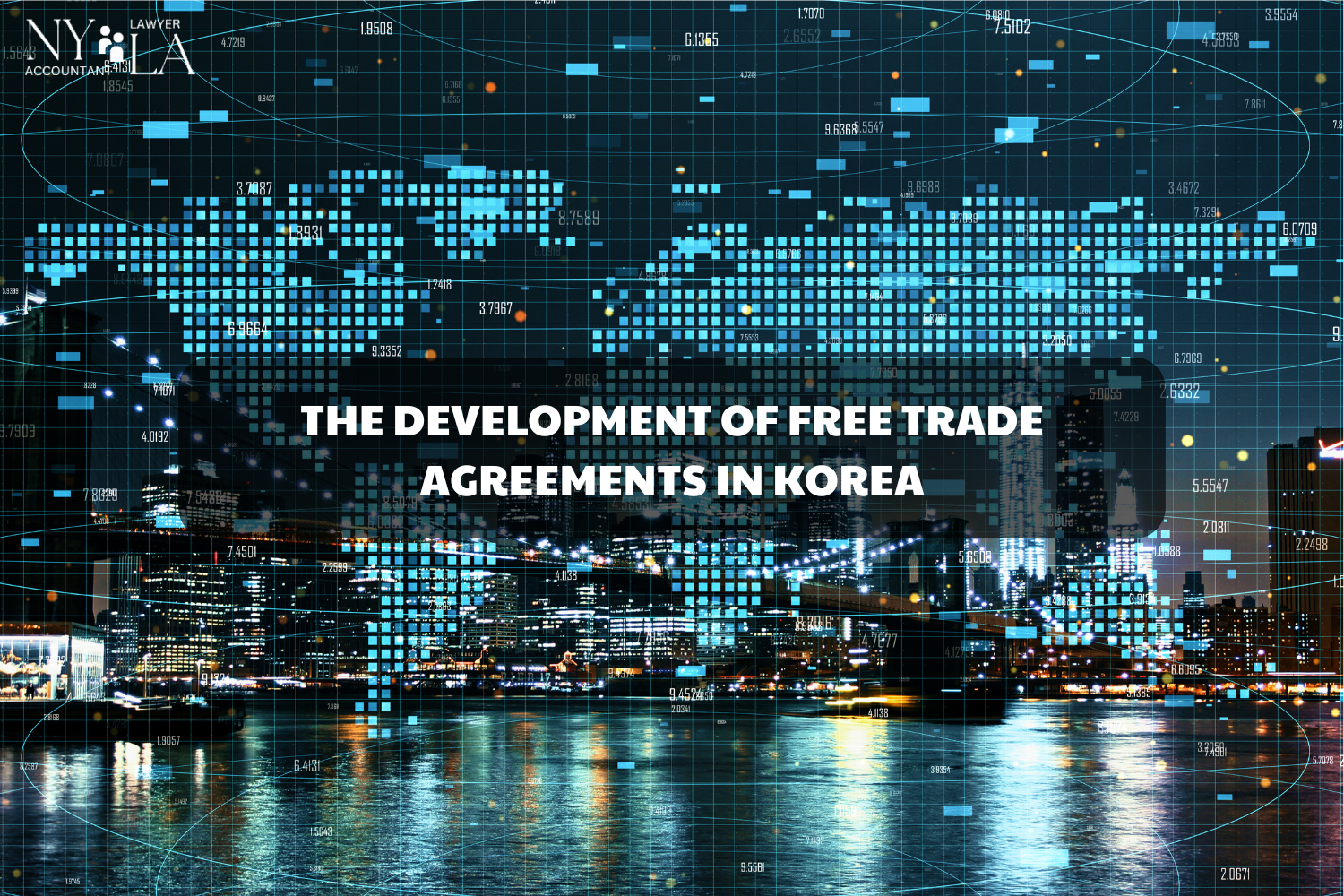Summary
- 1. Introduction to Free Trade Agreements in Korea
- 2. How Free Trade Agreements in Korea Affect Foreign Direct Investment
- 3. A Comprehensive List of Free Trade Agreements in Korea
- 4. Newly Signed Free Trade Agreements in Korea
- 5. Strategic Advantages of Free Trade Agreements in Korea
- 6. The Future of Free Trade Agreements in Korea
- 7. Conclusion: Why Free Trade Agreements in Korea Matter
- 8. About NYLA – Korean Legal Office
1. Introduction to Free Trade Agreements in Korea
Free trade agreements in Korea have become a cornerstone of the country’s international trade and investment strategy. As global markets become more interconnected, Korea has proactively entered into numerous FTAs to enhance its economic competitiveness. A free trade agreement (FTA) is essentially a pact between two or more countries to reduce trade barriers, such as tariffs and quotas, thereby promoting the smooth flow of goods and services. In the context of Korea, FTAs play a critical role in shaping its economic policy and attracting foreign direct investment (FDI).
2. How Free Trade Agreements in Korea Affect Foreign Direct Investment
One of the most significant impacts of free trade agreements in Korea is their influence on foreign direct investment. FTAs help eliminate or reduce trade restrictions, facilitating easier market entry for foreign investors. This is particularly beneficial for multinational corporations looking to establish operations in Korea.
Firstly, FTAs reduce export regulations, enabling smoother movement of intermediate and final products between parent companies in source countries and their affiliates in Korea. This leads to cost savings and operational efficiencies, encouraging companies to invest in Korean markets.
Secondly, the legal frameworks embedded within free trade agreements in Korea often include provisions that support greater capital mobility. These provisions make it easier for companies to move financial resources across borders, making Korea a more attractive destination for building factories, research centers, or regional headquarters.

3. A Comprehensive List of Free Trade Agreements in Korea
As of today, Korea has concluded and effectuated 21 FTAs with 59 countries, showcasing its commitment to economic openness. These free trade agreements in Korea not only boost trade volumes but also create favorable conditions for foreign investments.
Effectuated FTAs:
- EFTA (4 countries): Switzerland, Norway, Iceland, Liechtenstein
- ASEAN (10 countries): Brunei, Cambodia, Indonesia, Laos, Malaysia, Myanmar, Philippines, Singapore, Vietnam, Thailand
- European Union (27 countries): Including France, Germany, Italy, and Spain, among others
- Central America (5 countries): Nicaragua, Honduras, Costa Rica, El Salvador, Panama
- RCEP (Regional Comprehensive Economic Partnership): Korea, 10 ASEAN countries, China, Japan, Australia, New Zealand
These agreements demonstrate Korea’s active participation in major global and regional economic blocs. Particularly, the RCEP signifies a massive integrated market, making Korea a central player in Asian economic dynamics.
4. Newly Signed Free Trade Agreements in Korea
Korea continues to expand its FTA portfolio to tap into emerging markets:
- On October 26, 2021, Korea signed an FTA with the Philippines, aiming to strengthen its presence in Southeast Asia.
- On October 11, 2023, Korea entered into an FTA with Ecuador, providing a strategic gateway to the Latin American market.
These developments highlight the dynamic nature of free trade agreements in Korea and their role in enhancing global market access for Korean companies and foreign investors alike.
5. Strategic Advantages of Free Trade Agreements in Korea
Free trade agreements in Korea provide numerous benefits to both local and foreign investors:
- Market Access: FTAs open the doors to major economies, allowing Korean products to enter new markets with reduced tariffs.
- Investment Protection: Many FTAs include investor-state dispute settlement (ISDS) mechanisms, offering legal assurance for foreign investors.
- Economic Diversification: Through diversified trade partnerships, Korea reduces dependency on a few markets and fosters resilience against global uncertainties.
- Talent and Technology Exchange: FTAs often promote collaboration in technology and human resource development, enriching Korea’s innovation ecosystem.
6. The Future of Free Trade Agreements in Korea
Looking ahead, Korea is expected to continue negotiating and signing more FTAs to solidify its role as an international economic hub. The government is focusing on FTAs with emerging economies in Africa and South America, which offer untapped potential for Korean businesses and foreign investors looking to partner with Korean entities.
Additionally, as environmental and digital trade concerns gain global traction, future free trade agreements in Korea may include sustainable development clauses and digital trade frameworks, aligning Korea with next-generation trade standards.
7. Conclusion: Why Free Trade Agreements in Korea Matter
In conclusion, free trade agreements in Korea are not just trade pacts—they are comprehensive economic tools that shape the country’s investment climate. By reducing trade barriers, enhancing legal transparency, and providing market access, FTAs make Korea an increasingly attractive destination for foreign direct investment. As global investors seek stable, growth-oriented environments, Korea’s extensive network of FTAs positions it as a top contender in the global economic arena.
Whether you are a multinational corporation or a small business looking to expand globally, understanding and leveraging the benefits of free trade agreements in Korea could be your gateway to success.
8. About NYLA – Korean Legal Office

■ NYLA – Your Trusted Legal Partner in Korea
At NYLA, we understand that the success of foreign businesses in Korea requires not only a solid business strategy but also reliable legal support. With a team of experienced Korean attorneys and legal professionals, NYLA provides tailored legal services for companies, investors, and individuals operating or planning to establish a presence in Korea.
We support our clients throughout the entire business journey with comprehensive services, including:
- Legal consultation on company establishment, taxation, and immigration;
- Advice on commercial real estate, franchising, and product distribution;
- Support in human resources, marketing, and business strategy.
In addition to legal advisory, NYLA also represents clients in civil litigation cases related to business, labor, marriage, family, and inheritance to ensure their rights and interests are fully protected.
■ Contact NYLA

If you’re a foreign business or individual looking for a reliable legal partner in Korea, NYLA is here to help. We are committed to delivering effective, practical, and personalized legal solutions for every client.
With a proven track record of assisting hundreds of international clients, our team is equipped to help you navigate complex legal challenges—whether it’s commercial disputes, contract issues, or foreign investment guidance.
Don’t let legal matters hold you back. Let NYLA be your trusted guide in the Korean market.
■ Get in touch with NYLA for expert legal support
| Website: https://nylakoreanlegal.com/
FB: https://www.facebook.com/nyla.koreanlegal Tiktok: https://www.tiktok.com/@nylakoreanlegal Youtube: https://www.youtube.com/@NYLA-xd8qx Email: info.NYLAkoreanlegal@gmail.com SĐT: +82 10-3415-7859 |
 |






















































